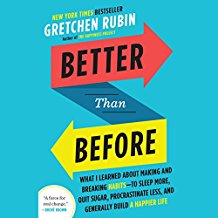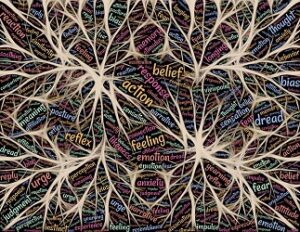 I’m concentrating right now on building happiness by establishing good habits within the limits of my character. This emphasis has grown out of Gretchen Rubin’s new book that I wrote about yesterday. I’ve been sharing my struggles to put accountability structures in place that will work with my obliger tendency, but I’m realizing that for some habits I’m just going to have to use some other prod or prods. I’ll be writing about these ideas over the next posts. I love putting my mind to a problem and finding a solution once I realize that there is a problem.
I’m concentrating right now on building happiness by establishing good habits within the limits of my character. This emphasis has grown out of Gretchen Rubin’s new book that I wrote about yesterday. I’ve been sharing my struggles to put accountability structures in place that will work with my obliger tendency, but I’m realizing that for some habits I’m just going to have to use some other prod or prods. I’ll be writing about these ideas over the next posts. I love putting my mind to a problem and finding a solution once I realize that there is a problem.
Habits
GR’s Great New Book
 Better Than Before: Mastering the Habits of Our Everyday Lives by Gretchen Rubin, Crown Publishers, 2015.
Better Than Before: Mastering the Habits of Our Everyday Lives by Gretchen Rubin, Crown Publishers, 2015.
This book has generated so much buzz that I almost felt anything I could possibly say would be superfluous, but this has truly been the book of the week for me, so here goes.
The most original insight of the book is that not everyone is the same in their abilities to form and stick to habits. As I’ve mentioned in several recent posts, I am what Gretchen calls an “obliger,” a huge category that is made up of people who have a hard time motivating themselves but are driven by others’ expectations. It’s probably also fair to say that obligers are eager to impress others, to collect what Gretchen calls “gold stars.” As I recognize more and more the truth about my basic nature I am driven more and more to work with it instead of against it. There is no way I can change myself into an “upholder,” someone who responds as readily to inner as to outer expectations, or a “questioner,” who will do the work as long as good reasons are given for it. Being an “upholder/questioner” seems ideal to me, but that’s not what I am.
The Accountability Conundrum
 As everyone in the known universe knows, Gretchen Rubin’s new book on habits, Better than Before, came out last week. While Gideon was getting his MRI on Friday at the hospital I walked over to the Tattered Cover Bookstore to buy my copy and get my admission ticket for her appearance there tomorrow night. I’ve been reading it kind of slowly, trying to savor it and take it all in. I even plan to do something very rare for me: go back and highlight the most important ideas.
As everyone in the known universe knows, Gretchen Rubin’s new book on habits, Better than Before, came out last week. While Gideon was getting his MRI on Friday at the hospital I walked over to the Tattered Cover Bookstore to buy my copy and get my admission ticket for her appearance there tomorrow night. I’ve been reading it kind of slowly, trying to savor it and take it all in. I even plan to do something very rare for me: go back and highlight the most important ideas.What do you need to form a habit?
 A time, a place, and a plan.
A time, a place, and a plan.
This principle is courtesy, once again, of Josh Waltz, the pastor of my church. The study of habits is really big right now, with the trend bookended by, of course, two books. Charles Duhigg’s The Power of Habit was a great hit three years ago; I quote from it fairly extensively in the chapter on habits in my own book. And tomorrow Gretchen Rubin’s new book Better Than Before: Mastering the Habits of Our Everyday Lives comes out. I can hardly wait to read it!
One of Duhigg’s best insights is the idea of so-called “keystone habits.” In my book I said that for me a keystone is getting up in the morning when I wake up instead of just lying there. This morning I did indeed get up at 5:00, and, while I wouldn’t say that the day has gone perfectly, I’ve certainly been more productive than usual.
No habit exists in isolation. My habit of a weekday 45-minute walk can’t take place unless there’s time for me to take it, which feeds right back into my getting-up-when-I-wake-up habit. And since I’ve strengthened the habit of cutting out most of the added sugar from my diet I’ve felt much more alert and willing to get up in the mornings. That difference makes me wonder if I’ve been going around with blood-sugar levels that have been just a bit high most of the time, which can’t have been good. Since my higher-than-expected A1C levels at the end of 2014 I’ve been very, very motivated to keep things under control. It wasn’t enough for me to just say, “Sugar isn’t good for anyone, so I need to just cut most of it out.” No, I needed a scare.
Just because it’s mid-March instead of New Year’s Day doesn’t mean you can’t start a new good habit. (It helps most of us to think in terms of doing something good rather than not doing something bad.) What can you do today to build a positive structure into your life?